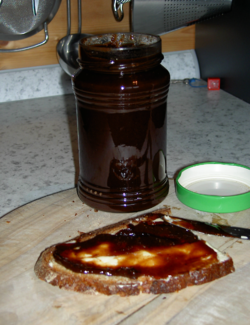
Powidl
Encyclopedia

Plum
A plum or gage is a stone fruit tree in the genus Prunus, subgenus Prunus. The subgenus is distinguished from other subgenera in the shoots having a terminal bud and solitary side buds , the flowers in groups of one to five together on short stems, and the fruit having a groove running down one...
stew
Stew
A stew is a combination of solid food ingredients that have been cooked in liquid and served in the resultant gravy. Ingredients in a stew can include any combination of vegetables , meat, especially tougher meats suitable for slow-cooking, such as beef. Poultry, sausages, and seafood are also used...
. Unlike jam or marmalade
Marmalade
Marmalade is a fruit preserve made from the juice and peel of citrus fruits, boiled with sugar and water. The benchmark citrus fruit for marmalade production in Britain is the "Seville orange" from Spain, Citrus aurantium var...
, and unlike the German
German language
German is a West Germanic language, related to and classified alongside English and Dutch. With an estimated 90 – 98 million native speakers, German is one of the world's major languages and is the most widely-spoken first language in the European Union....
Pflaumenmus (plum puree), powidl is prepared without additional sweeteners
Sugar substitute
A sugar substitute is a food additive that duplicates the effect of sugar in taste, usually with less food energy. Some sugar substitutes are natural and some are synthetic. Those that are not natural are, in general, called artificial sweeteners....
or gelling agents.
Powidl is cooked for several hours, in order to achieve the necessary sweetness and consistency. The plums used should be harvested as late as possible, ideally after the first frosts, in order to ensure they contain enough sugar
Sugar
Sugar is a class of edible crystalline carbohydrates, mainly sucrose, lactose, and fructose, characterized by a sweet flavor.Sucrose in its refined form primarily comes from sugar cane and sugar beet...
.
In Austria
Austria
Austria , officially the Republic of Austria , is a landlocked country of roughly 8.4 million people in Central Europe. It is bordered by the Czech Republic and Germany to the north, Slovakia and Hungary to the east, Slovenia and Italy to the south, and Switzerland and Liechtenstein to the...
and Bohemia
Bohemia
Bohemia is a historical region in central Europe, occupying the western two-thirds of the traditional Czech Lands. It is located in the contemporary Czech Republic with its capital in Prague...
, powidl is the basis for Buchteln
Buchteln
Buchteln are sweet dumplings made of yeast dough, filled with jam, poppy seed paste or curd and baked in a large pan so that they stick together. The traditional Buchtel is filled with plum powidl jam...
, powidl cake and Germknödel
Germknödel
Germknödel is a fluffy yeast dough dumpling with a mix of poppy seeds and sugar, filled with spicy plum jam and melted butter on top, often eaten with vanilla cream sauce....
, but it is also used as a sandwich spread. Powidl will keep for a long time, especially if kept in traditional crockery.
Traditionally, large amounts of powidl to be used as a winter store and natural sweetener were prepared in late autumn during a communal event. Since constantly stirring the stew was exhausting work, people took turns, and did easier work in between turns. The Czech term povidla is plural only (the Polish word powidła as well) and is derived from povídat, which means to tell stories.

